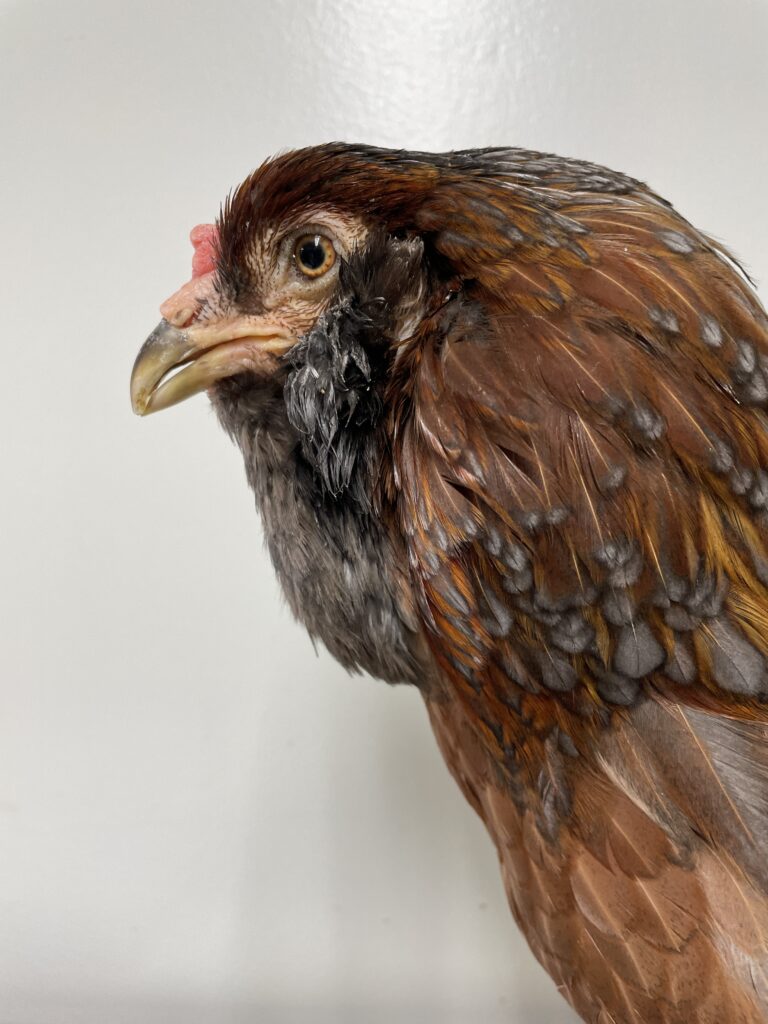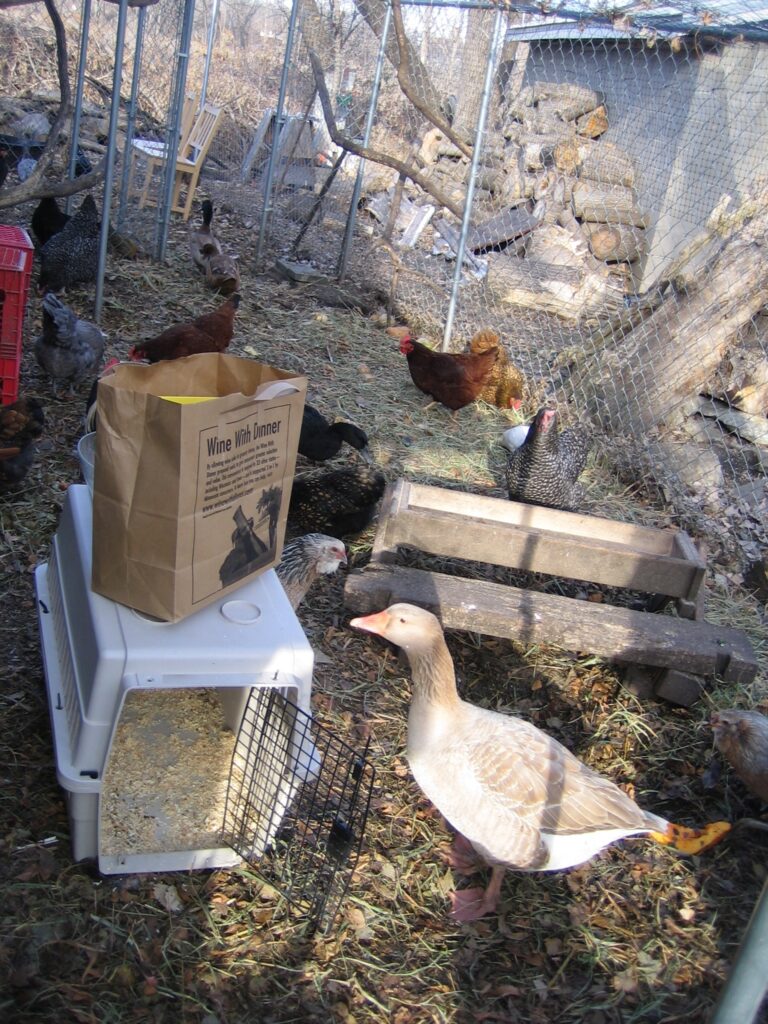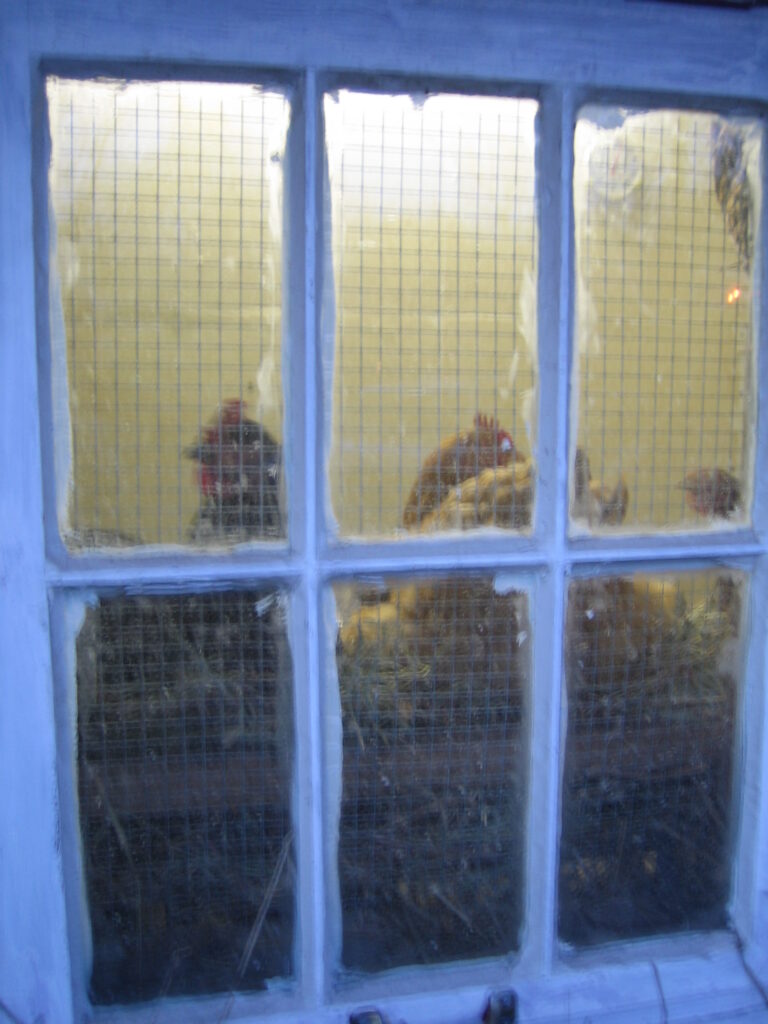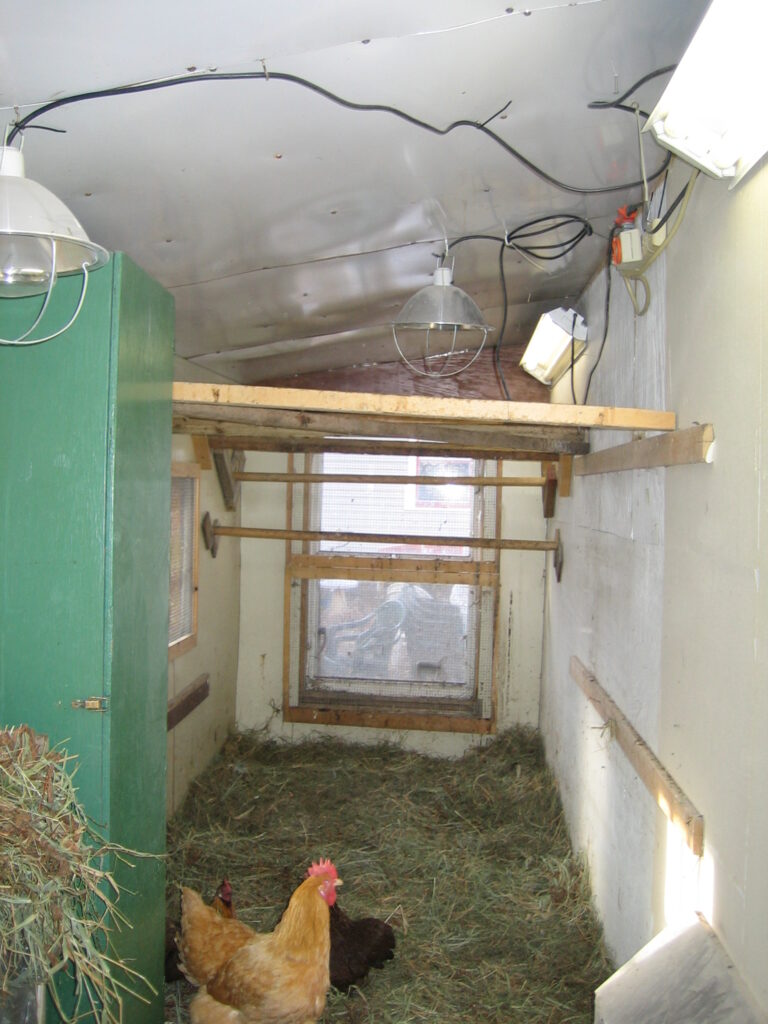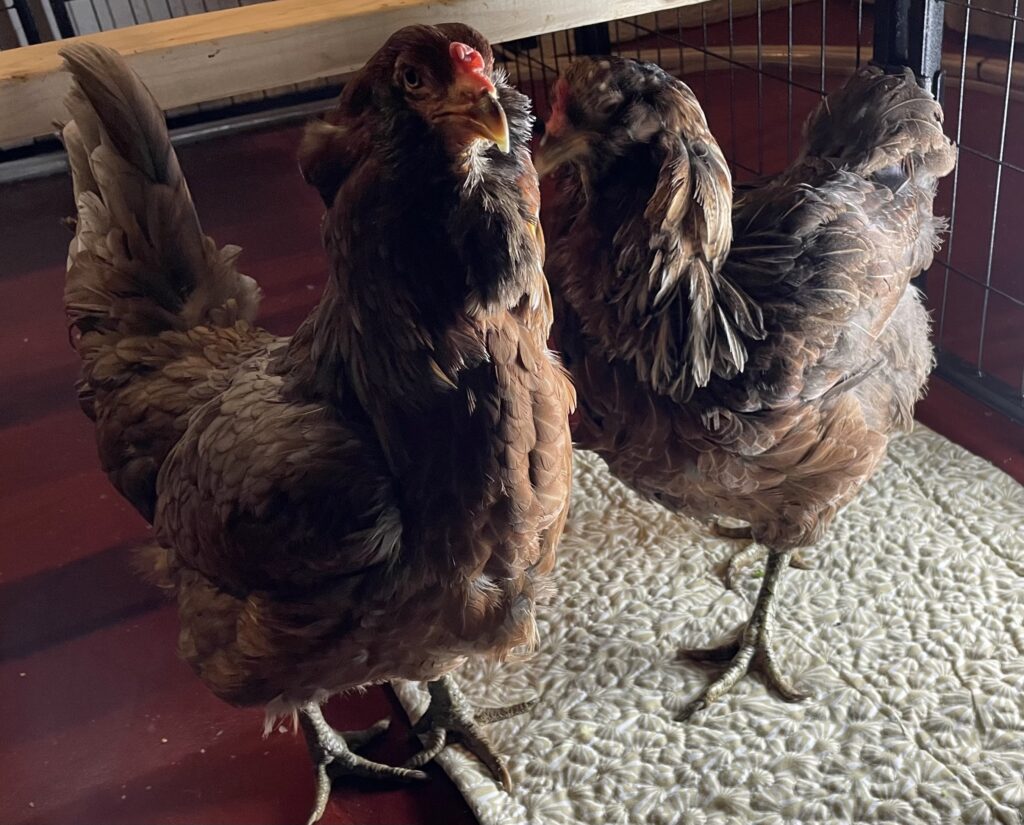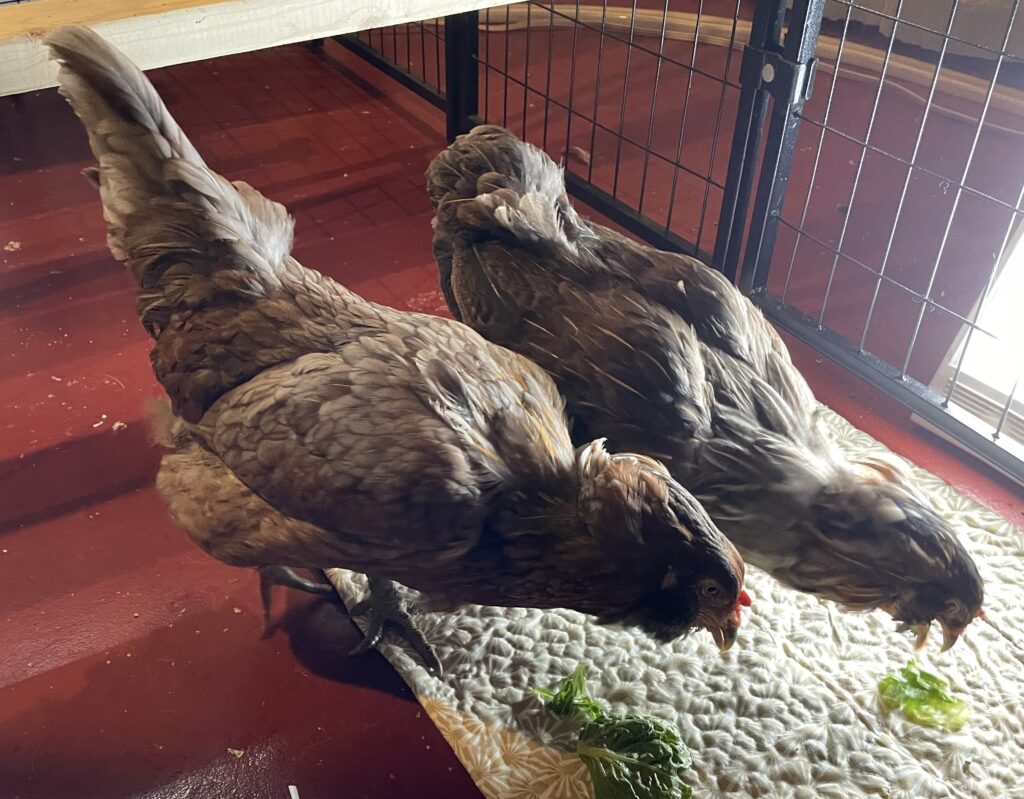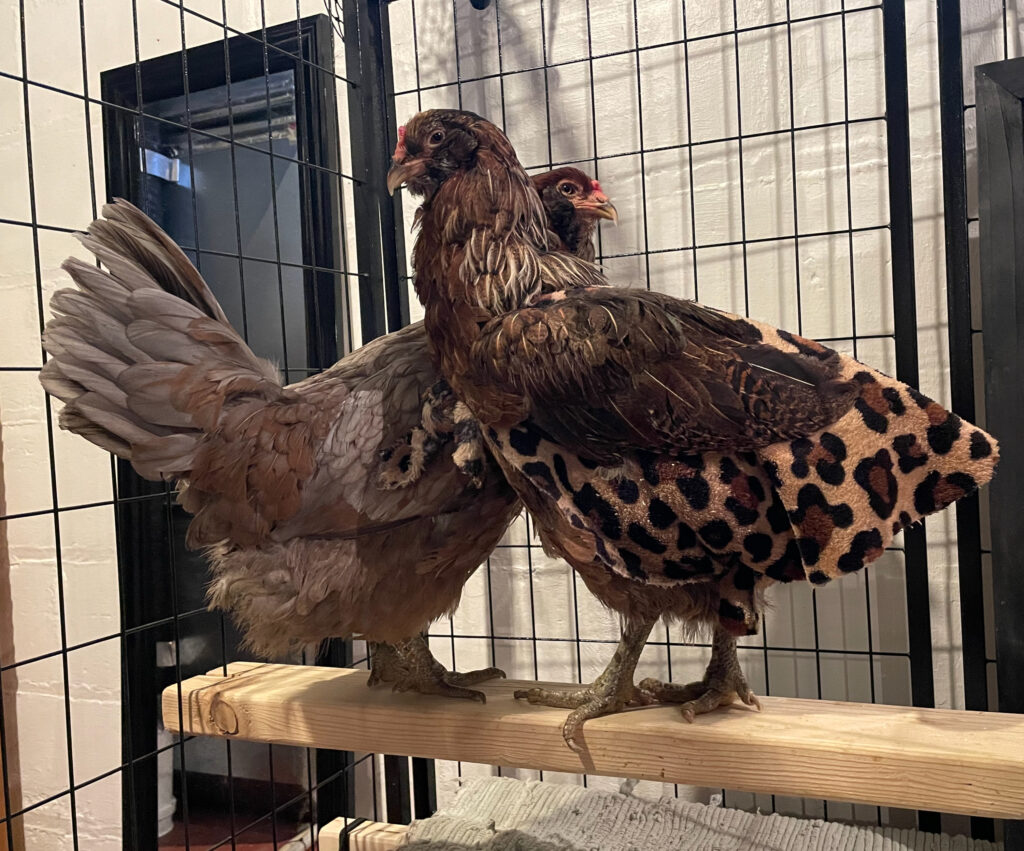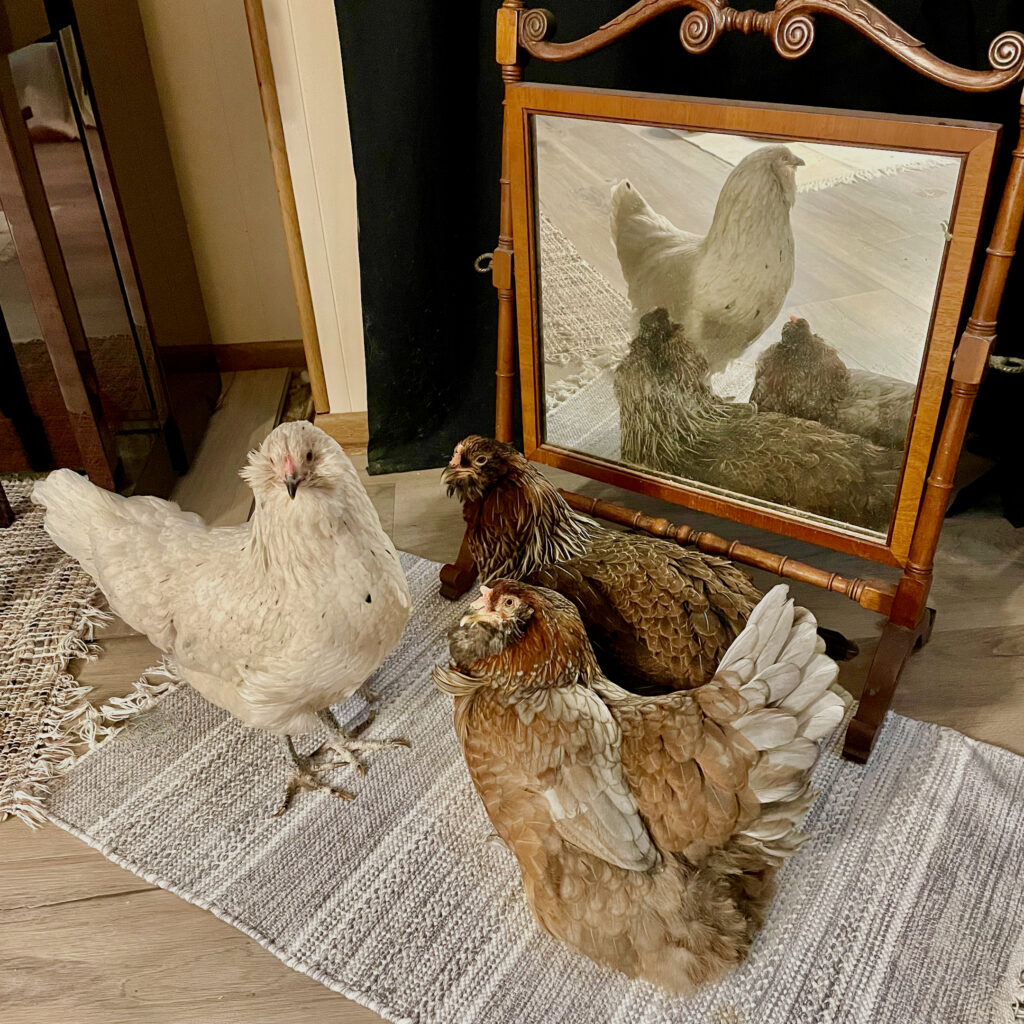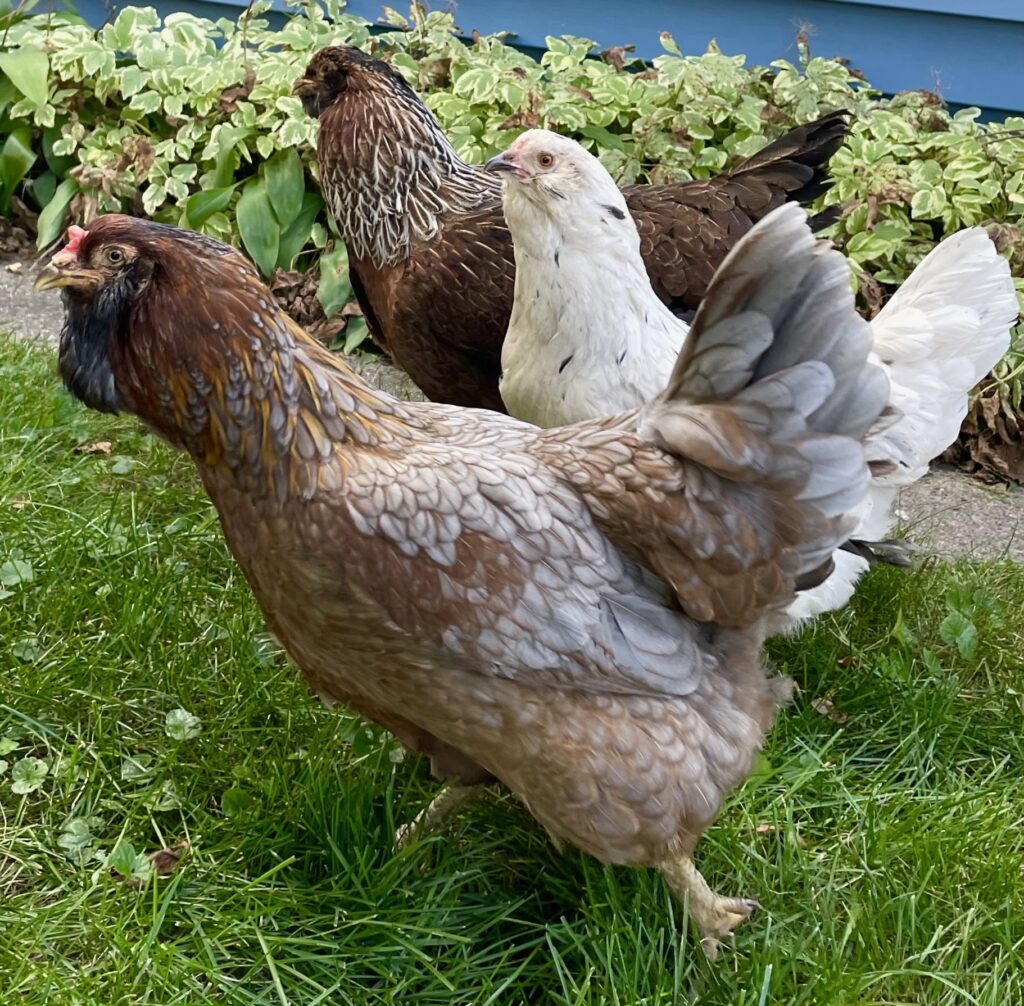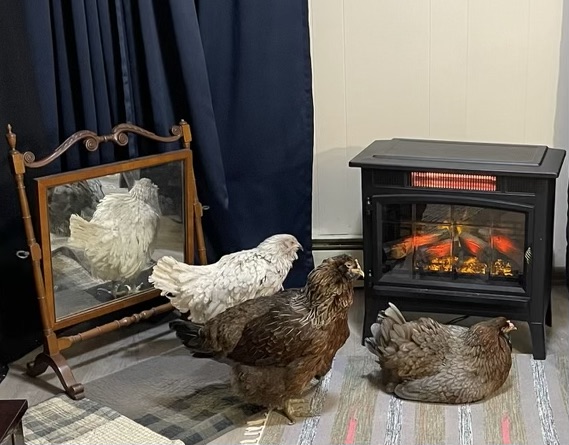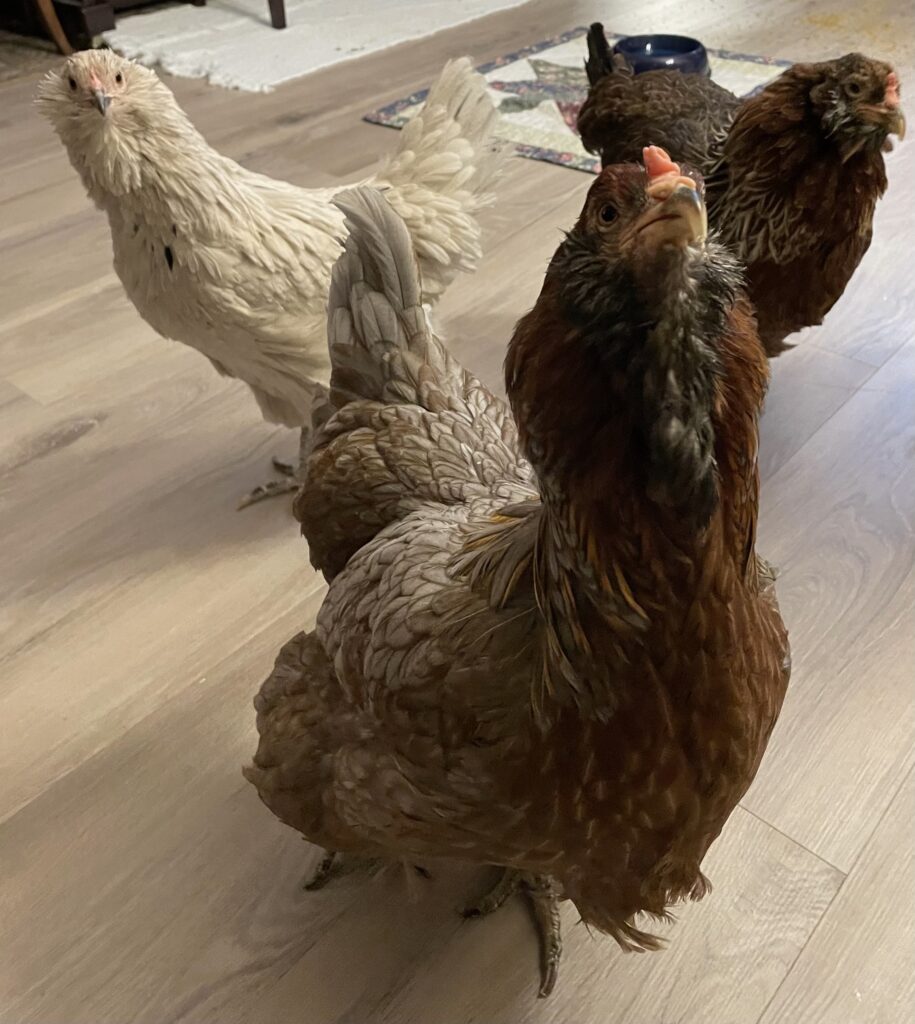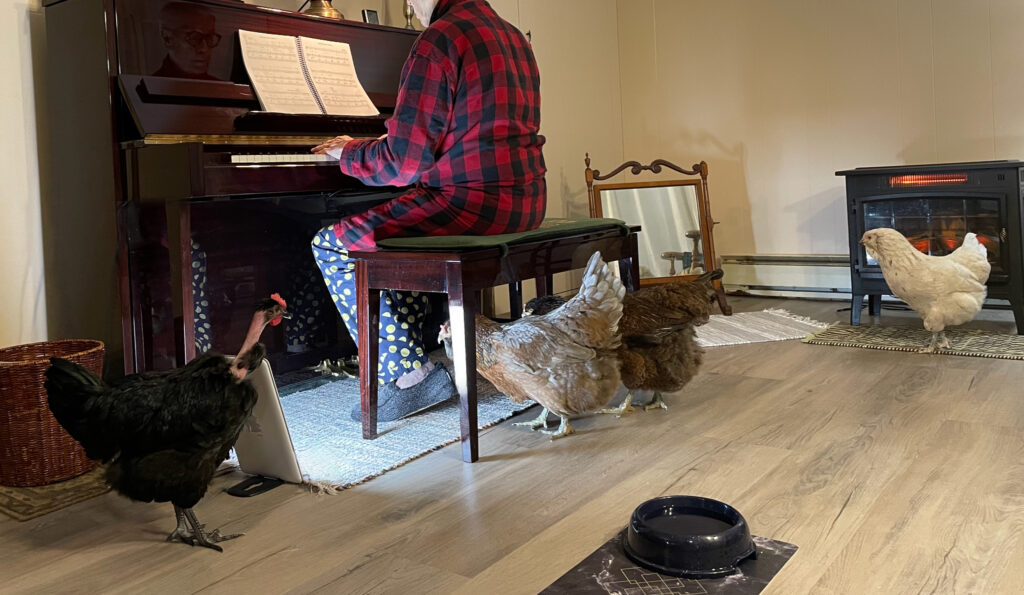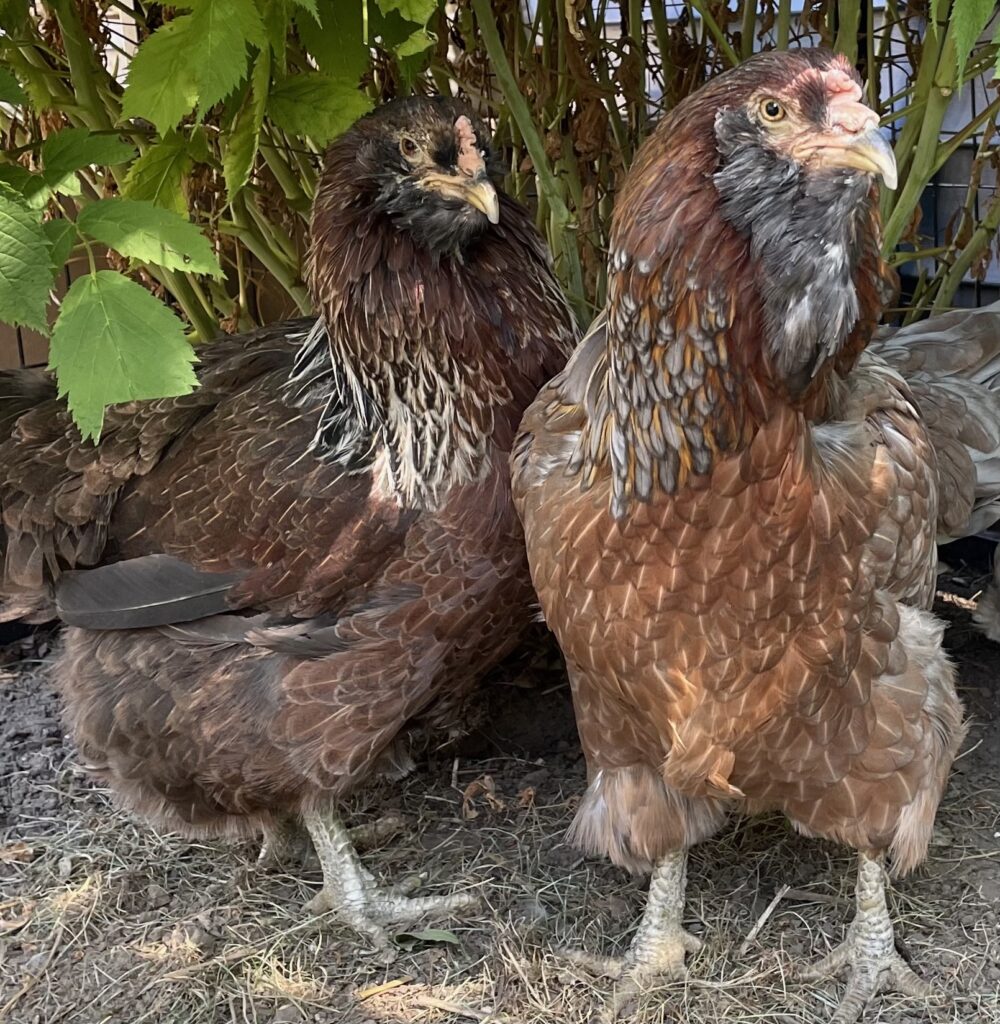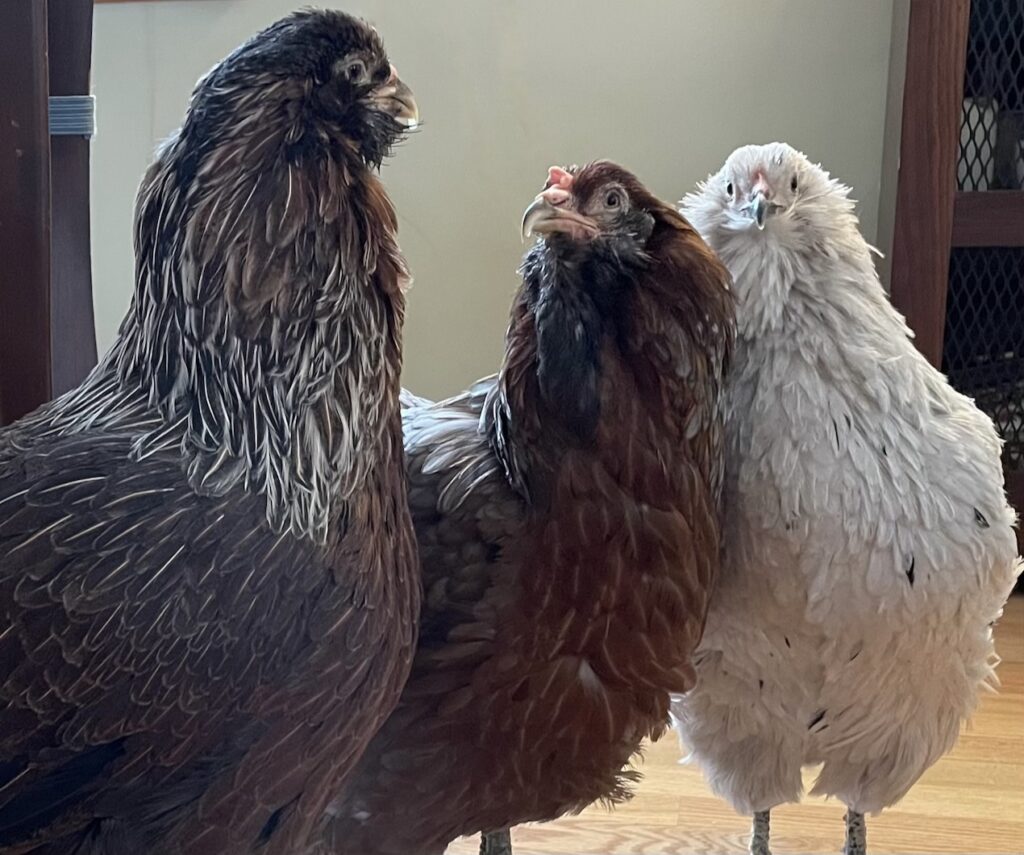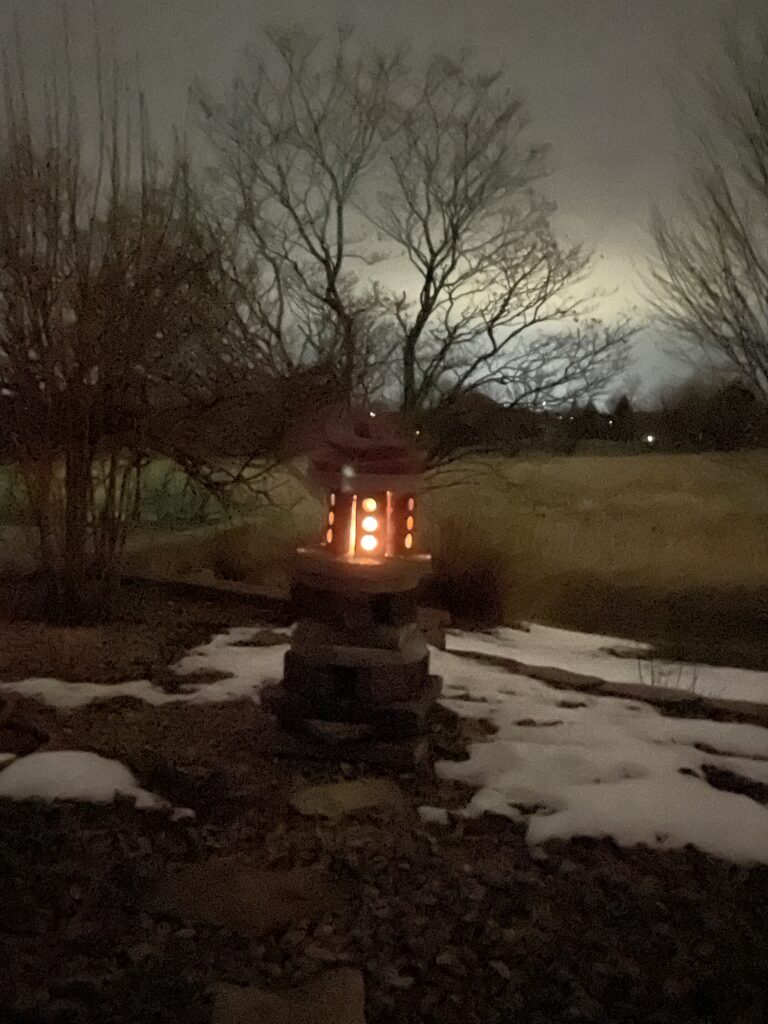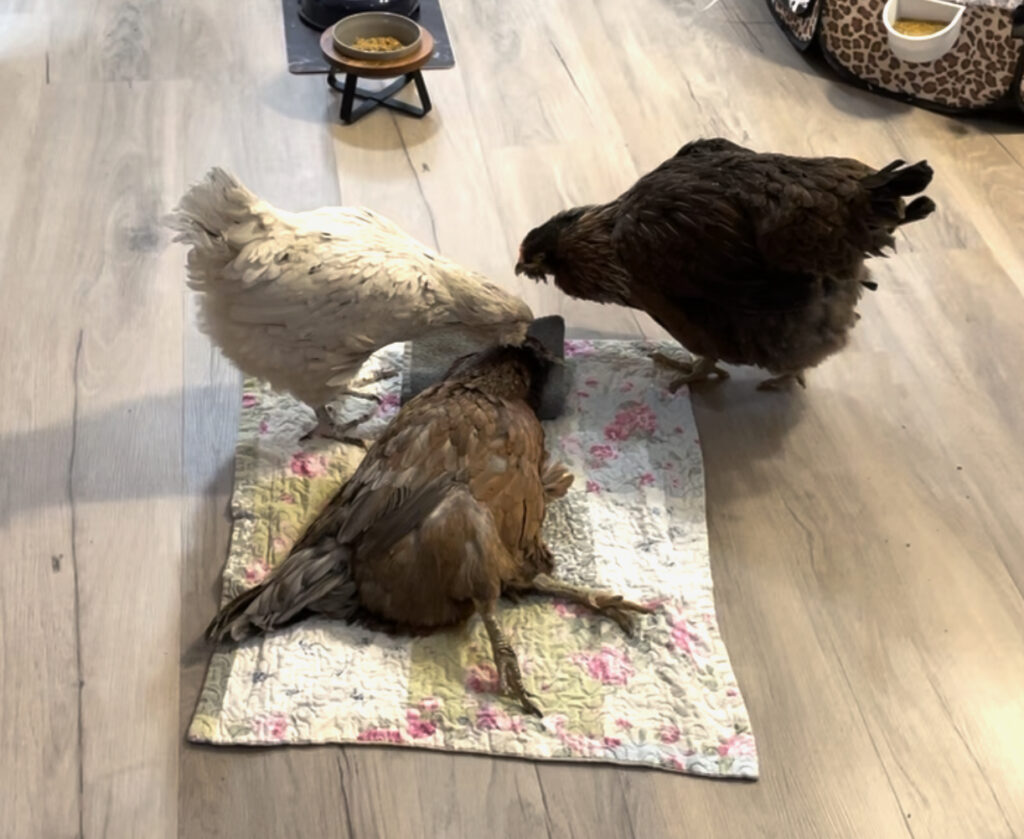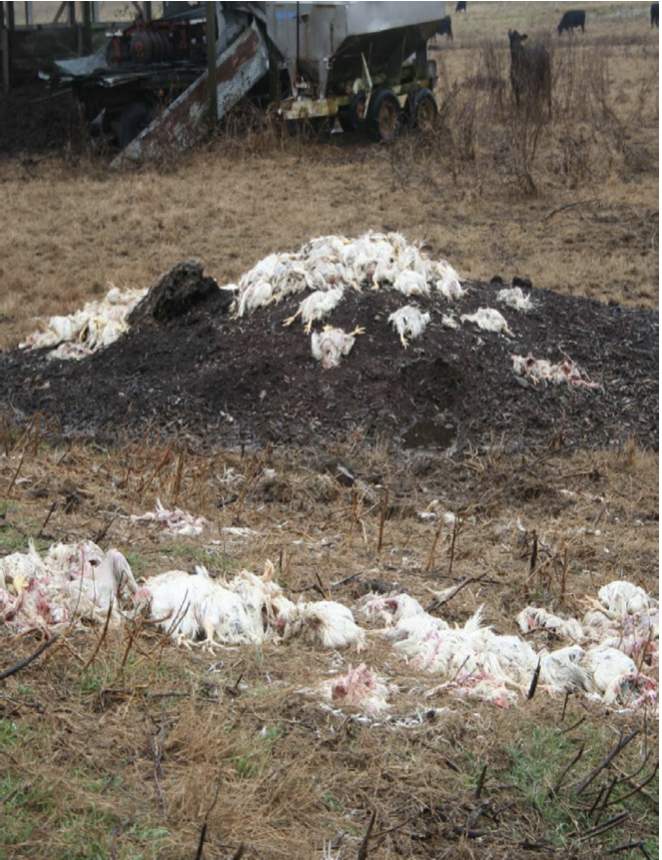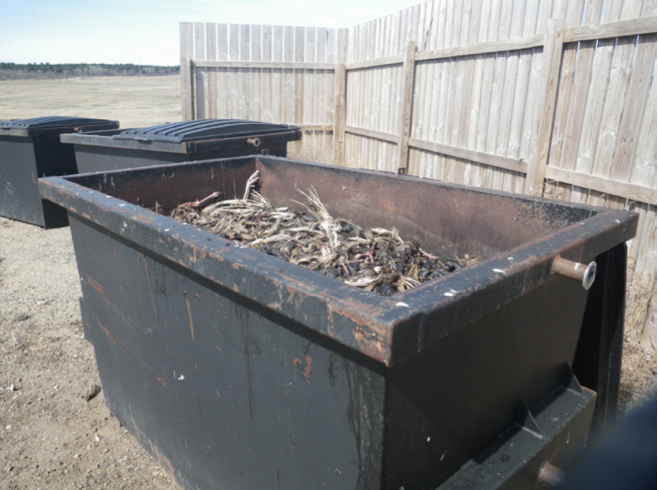A guest blog by Chicken Run Rescue (CRR)
April 11. 2024
How we first came in contact with Amma
March 24, 2022 “Good afternoon, We have just obtained two lovely hens that were owner surrendered due to the owner reportedly being unable to keep their coop (and thus the neighboring properties) clear of rodents. Owner stated these hens are 10 years old… Let us know if you think you may be able to find foster for them.”
We named these two Amma and Nonna- Icelandic and Italian for grandma, respectively. They were nameless where they came from. For once, we had the perfect foster home available. That never happens, but the heavens were smiling on them. We learned later that we actually had a connection to them that was intertwined with the history of our work to help birds victimized by the backyard chicken fad in the Twin Cities. That well-meaning infatuation is part and parcel of a much broader movement to market animal agriculture in the backyard or the corporate farm as kind, ethical and sustainable; seasoned animal advocates call it “The Humane Hoax.”
Amma and Nonna’s Story and its Relationship to International Respect for Chickens Day
Amma passed away on March 28, almost 2 years to the day from when we were asked to help her and her sister, Nonna. As we prepare to observe International Respect for Chickens Day, her story seems a perfect way to show how she was systematically victimized, then saved and celebrated. Where there is use there is always abuse. The quality of life for the hapless birds kept as food in commercial and backyard prisons is a race to the same bottom line, where cheap eggs, meat and profit becomes a distinction without a difference between them.
Amma and Nonna, as it turns out, came from the home of the leading proponents of using and slaughtering backyard chickens, other birds and rabbits for food in the Twin Cities. The fad was set in motion in 2005 with lavish attention from local media and a burgeoning locavore movement. Since then, however, the novelty wore off for its enthusiasts, who then moved on to other pastimes, but the damage was done. Amma and Nonna endured neglect and indifference in a rat-infested existence for over 10 years, until neighborhood complaints to authorities changed the course of their life: “Exterior Nuisance Complaint….. Dec 21, 2021 6:27:00 PM…..Dec 22, 2021 5:23:00 PM…..XXX ISLAND AVE W…..Chicken coop in backyard of this property is not being maintained. Currently there is a mice infestation in the chicken coop and mice are spreading to adjacent properties in the neighborhood.”
Amma and Nonna’s first home- neglect and indifference inside and out
Amma and Nonna were not impounded at animal control until March 24, 2022 as the magnitude of the outbreak of bird flu became apparent and biosecurity measures were being developed and implemented. CRR’s own biosecurity plan required that new birds be quarantined for a minimum of 3 weeks, so the sisters had a lengthy stay at the shelter but they were clean, dry, safe and warm and didn’t have to compete for food. CRR took custody of them on April 20 when CRR Caregiver Melissa Swanson picked them up and took them to the waiting arms of their foster, Laura MacKenzie.
Amma and Nonna’s Life with their CRR Foster Family
Laura is a professional musician with a gift for observation, narrative, and photography so their adaptation to a new life as house chickens was beautifully chronicled:
4/20/22
Nonna and Amma’s First Day: They seem very stressed and look thin and rough. Amma was pecking Nonna heavily this morning, so they have been separated. Neither has used the roost in the crate or the roosts in the pen (maybe they’ve never had a roost?). FaLaLa (a foster here since Jan. ’22) is wandering around being exceptionally vocal (shouting, I’d say!). I trust this means she is excited about their presence.
4/21/22
Day Two: Amma continues to peck Nonna’s back, pulling out feathers. We believe it is nervous behavior due to stress. I separated them again, but they let me know very clearly they needed to be together. I believe it will take a while for their stress levels to drop and their eating habits to settle. Nonna seems a bit unstable in her footing, and weak. They still seem uninterested in their crumble or mush. This is the same good food I’ve seen other foster rescues eat with gusto. I will “crumble” soon and offer them treats. I’ve not noticed them drinking. FaLaLa made the rounds of Amma and Nonna’s places a few times this morning, chatting and checking in with everybody.
4/26/22
When I spilled water, Amma and Nonna rushed to sip it out of the puddles. This probably speaks to their former lives. I’ve moved their food and water from hanging dishes to the floor, and everyone is eating and drinking heartily. When I bring a romaine treat, they literally jump up in the air to grab it – before I’m ready! Amma and Nonna are sleeping together at night, one tucked under the other. FaLaLa is learning how to stay out of her new elder sisters’ way.
5/4/22
Finally, I see Amma and Nonna resting now and then during the day, no longer on constant high alert. Nonna’s previous instability and the look of weakness in her eyes are going away. They have discovered the joys of using the roosts, and go straight to the top, right after breakfast.
8/9/22
The girls are doing well. Sitting down to observe them is like a mini holiday. I will never tire of this! They are such masters of eye contact. This is profoundly moving to me. FaLaLa continues to develop her amazing plans, designs and tactics in her efforts to gain acceptance with Amma and Nonna, fascinating and inspiring to observe. FaLaLa has taught me so much about socialization, preparing us for future fosters. She has been a great and subtle teacher. Sometimes not so subtle!
10/10/22
Amma’s breathing when at rest has become labored, and her voice has changed…we are very worried. The notes from her visit to the hospital today are not easy to handle…they found an enlarged reproductive tract, particularly the oviduct. And a large irregular soft tissue mass in her abdomen that might be associated…these are likely creating a lack of normal air sac space. We will keep her on the antibiotics for now. (We were not able to resolve these issues with her future vet visits, but her strong spirit and zest for life returned).
1/25/23
Amma & Nonna together: These two are so wonderfully bonded, and they have become more trusting of us as well. I continue to enjoy letting them out every morning from their night-time crate, as almost every day it is Nonna first, who then turns around to peck Amma lightly until Amma steps out. To me, it looks like she is making sure Amma gets up and out. Next, they start their March to the Mirrors, a favorite spot to preen. Breakfast follows.
1/25/23
I recently felt Nonna was a bit frail again, but when I look into her eyes, which are clear, bright and alert, and see her hop up the steps, she actually seems as robust as…a thriving old oak, a tall proud ship, with Amma sailing right alongside.
3/27/23
The three are so funny when left alone in “Gary’s Studio & Chicken Lounge”. After a very short time without company, they stand at the gate calling up, taking distinct turns, and I can always hear “Gary! Hey Gary! Come on Gary!”. If the gate is open, they come up for a kitchen party, usually with Amma in the lead. Kitchen parties with treats are the best. When they feel the party is over, they stand in a huddle – a good cue!
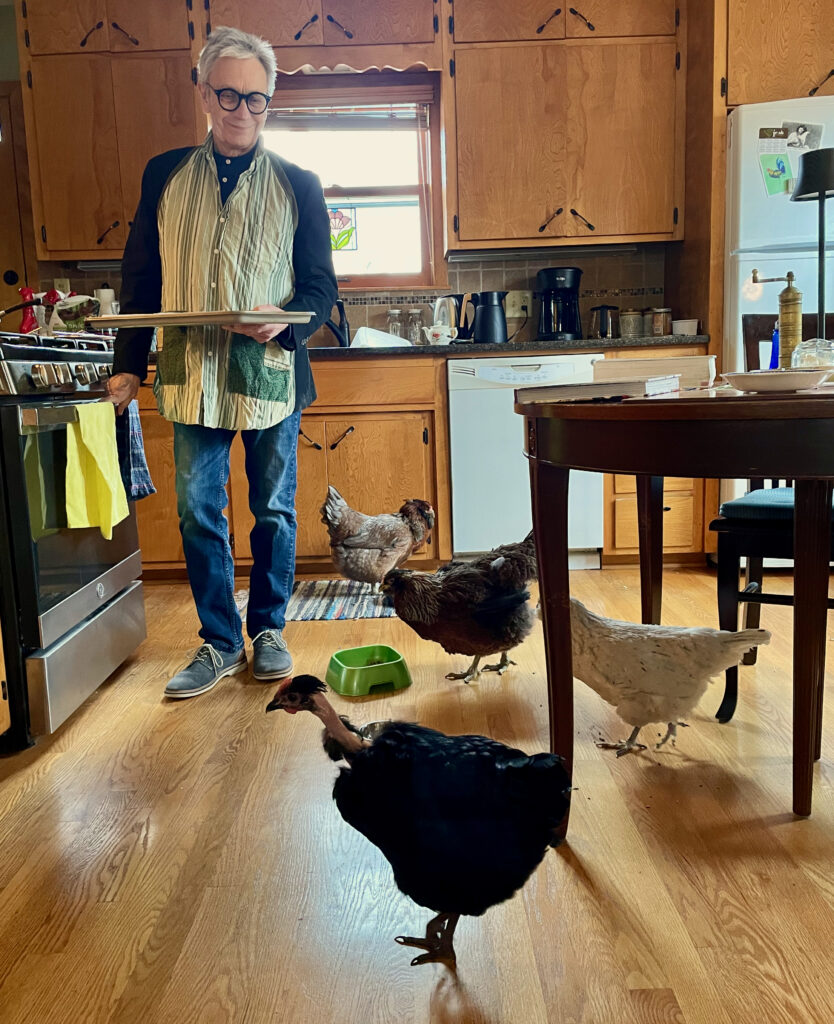
6/6/23
Young Audrey came to us as a rescue foster and joined the troupe. What a time for all! We love her to bits. She is hopeful for acceptance, “learning the ropes”.
8/8/23
All are grateful for the outdoor pen, and our willow tree. Everyone loves going outside for dustbaths and to pretend (I believe) they are jungle fowl once again as they wander through the deep, low willow branches.
2/10/24
The girls: Right now, I feel they are at a high point. This is precious time to enjoy with them. Due mainly to the amazing current health of the super seniors. Nonna is a better “self” than she has been for some time and is often standing her full height, which is an impressive height! Amma is partying often, very vocal, and is always curious-plus. The hoarseness she developed last year has gone away, and she has her cluck back.
3/28/24
We are bereft. Our Amma girl, my party girl, gone. The mass in her ovaries and abdomen overwhelmed her health. Amma girl truly had a wonder year, but she could not be kept comfortable now. With the help of our trusted vet, Dr. Noemi Plantz at Homey Gnome Clinic, she has moved on. We brought her body home so the others could see her, visit her, and hopefully understand. At bedtime, Nonna paced and searched every corner of her crate for a sign of Amma. For a long while, calling out. Audrey called out repeatedly from her night-time crate, something never heard before. FaLaLa, always our loud girl, fretted softly.
The Evolution of CRR’s Mission
When we started CRR the intent was to adopt out rescues but finding homes that met our standards became next to impossible. We had a perception of “customary care” to overcome: Small, barren pens or “tractors” (read: small cages that move around with the bird) are hyped, as are ramshackle “coops” (read: boxes) constructed from “recycled” materials (read: junk) that have less space than a battery cage and are lacking in protection from extreme weather and predators. Whether backyards or batteries, the birds are forced to live in their own overcrowded filth and subject to whatever treatment suits their captors. For physical evidence of the tragic suffering our rescues arrive with see our Facebook album Casualties of Urban Animal Agriculture
The HPAI Virus and USDA Practices
Recent reports of the spread of the HPAI virus to mammals used for food have exploded. The USDA and CDC reinforce what’s good for the industry with warnings against kissing companion chickens, yet rewards the very practices at the source of the virus that now leads the headlines with infected goats, dairy cows, and humans. “If you wanted to create the ideal environment for fostering the mutation of pathogens, industrial farms would pretty much be the perfect setup,” said Gwendolen Reyes-Illg, a scientist at the Animal Welfare Institute who focuses on meat production told the New York Times. The article continues: “Last year, the Department of Agriculture paid poultry producers more than half a billion dollars for the turkeys, chickens and egg-laying hens they were forced to kill after the flu strain, H5N1, was detected on their farms… By compensating commercial farmers for their losses with no strings attached, the federal government is encouraging poultry growers to continue the very practices that heighten the risk of contagion, increasing the need for future cullings and compensation.”
A USDA factsheet, Improving Biosecurity with Wildlife Management Practices: Protecting Food Resources warns “To prevent wildlife access to waste, keep carcasses and compost piles covered at all times.” It includes pictures of open dumpsters and dead piles of bedraggled chicken corpses not because they are horrific but because they are recognizable hallmarks of what animal agriculture looks like behind closed doors.
The Growth of Surrender Inquires Coming to CRR
Before 2009, CRR averaged fewer than 40 surrender inquiries a year from public shelters or private individuals with unwanted birds who needed help. Since 2009 when we first began keeping surrender statistics, we’ve been asked to help over 3,935 animals from urban backyard farms, overwhelmingly chickens. In Minneapolis, there were 26 fowl permits when we started in 2001. 988 permits have been issued as of February, 2024. Based on Minneapolis permit data, there is a potential total of 7,158 permitted domestic fowl in Minneapolis. And then there are those who don’t bother with the permit. A 2018 Pet Licensing Industry Research survey by DocuPet revealed that 93% of cats were unlicensed where mandatory licensing was required. No such data for chickens exists to our knowledge but a safe assumption would be the permit compliance rate for chickens would be close to that for cats. That means there could be 95,099 chickens and other fowl the City doesn’t know about and hasn’t budgeted the funds to protect and regulate.
In no way can we help them all, but city residents who care about animals and a sustainable food future can, and should, make a difference on their very own block.
CRR’s Accomplishments with the Minneapolis City Council
CRR rescues originate in the Metro Area, 1,216 as of this writing. CRR declared itself as a “stakeholder” impacted by City chicken policies and worked exhaustively for 16 years with the Minneapolis City Council, Regulatory Services and Animal Care and Control to effect chicken permit policies that would protect chickens. The accomplishments we were able to secure included:
- inclusion of the MN Statute definition of “Companion Animal” in the city ordinance which allows the “owner” to assign companion animal status to chickens. Cruelty to a companion animal is a felony, cruelty to a “food” animal is a misdemeanor, if it’s even charged.
- eliminated a proposed rooster ban (However, a prohibitively expensive special permit for roosters was instated that requires 80% neighbor approval and restricts the number of roosters to one.)
- eliminated an existing ordinance that prohibited sheltering chickens in a dwelling—vital for Tropical Jungle Fowl in an extreme climate like Minnesota.
- prohibition of slaughter in the City.
We were able to educate and sensitize some officials and walked away with a letter of commendation from the City Council President praising our efforts, but the overwhelming sway was held by the “locavores” who evangelize the backyard chicken keeping fantasy as a “sustainable” activity. To our frustration, cities still actively and blithely promote it as a “sustainable” activity. Hatcheries and city-based businesses continue to profit from selling the birds and supplies and greenwash their complicity in the glut of abandoned birds, especially roosters. A local Twin City source for backyard chicks and supplies states on their website: “As the seller (not the hatchery that performs the sexing) we are, unfortunately, not able to offer a refund or replacement if a member of your flock turns out to be a rooster. We are also not able to take back roosters for rehoming.”
The Current Situation with Urban Chickens
Craigslist and NextDoor have become dumping grounds. The fad has created a nationwide epidemic of unwanted chickens, ducks, geese, quail, and other domesticated fowl abandoned in alleys, parks, at animal sanctuaries and shelters when health, behavior, upkeep, cost or sex become inconvenient and the novelty wears off.
The irony now is that funding for CRR and other animal sanctuaries that rescue victims of animal agriculture has drastically diminished. CRR is currently seeking a new location for our sanctuary, all backyard outcasts, but poorly conceived chicken ordinances in every city prohibit roosters, limit hens and restrict housing options making it impossible to re-locate.
To find homes where they will be loved and respected, we reach and teach other vegans. As of this writing, 33 residents are permanent here and new birds are only accepted if we have a fully coached and equipped foster home waiting for them. Our placement policy now requires extensive training as a volunteer, a transition to foster care and progression to adoption if the fit is a good one.
Cities allowing chickens (and banning roosters) are now too numerous to mention and still growing. “Problems Coming Home to Roost” is now a common headline but Covid-induced free time followed by bird flu-induced egg shortages led sell outs of hatchery chicks and has exacerbated the already horrific situation. Whether its in a battery cage, an “enriched cage” or a backyard, constant laying kills hens. Constant breeding kills unwanted roosters. Nothing benign or natural about it. There is no such thing as a “vegan” egg. There is a bird like Amma who suffers for it. A bird who had a history and an interest in living.
How to Advocate for Chickens and All Animals
Many urban activists shy away from farm animal advocacy due to lack of confidence that comes from first-hand knowledge. Truly knowing an animal comes from loving them for who they are not for what can be taken from them. This knowledge can give us courage in our convictions and make us more effective in educating those around us. Advocate for the chickens and all animals:
- Speak up – if you see abuse or neglect, report it.
- Participate in public policy planning that impacts chickens in your community.
- Challenge all misleading publicity about happy meat, milk and eggs – that’s what social media was made for.
- Volunteer at CRR to learn and help.
International Respect for Chickens Day
Do something on May 4, International Respect for Chickens Day, to engage others:
- Print or post a portrait of a resident at CRR where others will see it and want to know more.
- Make a delicious animal-free treat to share.
For the 19th year, CRR will join activists around the world in celebrating International Respect for Chickens Day.
- Nationally, CRR is partnering with the Humane Hoax webinar streamed live at the sanctuary on May 4, International Respect for Chickens Day.
- Locally, CRR, in partnership with Compassionate Action for Animals will host a day for volunteers who will
- help care for the birds
- pose in a group photo of the volunteers each holding a portrait of each and every bird who calls Chicken Run Rescue home.
- enjoy a pot luck of animal-free food
- view a special projection of the Humane Hoax webinar including tributes to the late Karen Davis
Corporate farm, “organic small scale” or backyard farms, all are extensions of, not
alternatives to, exploiting animals for food. Sustainable agriculture grows gardens not
victims. Amma spent her life in anonymity, but was celebrated last year and will be
remembered by all going forward.

